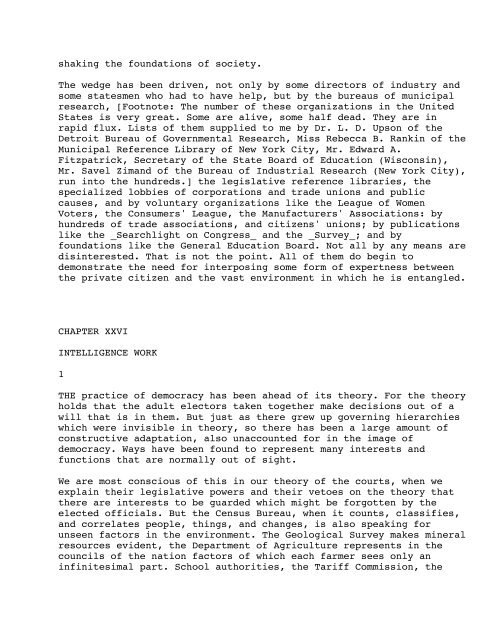PUBLIC OPINION by WALTER LIPPMANN TO FAYE LIPPMANN ...
PUBLIC OPINION by WALTER LIPPMANN TO FAYE LIPPMANN ...
PUBLIC OPINION by WALTER LIPPMANN TO FAYE LIPPMANN ...
Create successful ePaper yourself
Turn your PDF publications into a flip-book with our unique Google optimized e-Paper software.
shaking the foundations of society.<br />
The wedge has been driven, not only <strong>by</strong> some directors of industry and<br />
some statesmen who had to have help, but <strong>by</strong> the bureaus of municipal<br />
research, [Footnote: The number of these organizations in the United<br />
States is very great. Some are alive, some half dead. They are in<br />
rapid flux. Lists of them supplied to me <strong>by</strong> Dr. L. D. Upson of the<br />
Detroit Bureau of Governmental Research, Miss Rebecca B. Rankin of the<br />
Municipal Reference Library of New York City, Mr. Edward A.<br />
Fitzpatrick, Secretary of the State Board of Education (Wisconsin),<br />
Mr. Savel Zimand of the Bureau of Industrial Research (New York City),<br />
run into the hundreds.] the legislative reference libraries, the<br />
specialized lobbies of corporations and trade unions and public<br />
causes, and <strong>by</strong> voluntary organizations like the League of Women<br />
Voters, the Consumers' League, the Manufacturers' Associations: <strong>by</strong><br />
hundreds of trade associations, and citizens' unions; <strong>by</strong> publications<br />
like the _Searchlight on Congress_ and the _Survey_; and <strong>by</strong><br />
foundations like the General Education Board. Not all <strong>by</strong> any means are<br />
disinterested. That is not the point. All of them do begin to<br />
demonstrate the need for interposing some form of expertness between<br />
the private citizen and the vast environment in which he is entangled.<br />
CHAPTER XXVI<br />
INTELLIGENCE WORK<br />
1<br />
THE practice of democracy has been ahead of its theory. For the theory<br />
holds that the adult electors taken together make decisions out of a<br />
will that is in them. But just as there grew up governing hierarchies<br />
which were invisible in theory, so there has been a large amount of<br />
constructive adaptation, also unaccounted for in the image of<br />
democracy. Ways have been found to represent many interests and<br />
functions that are normally out of sight.<br />
We are most conscious of this in our theory of the courts, when we<br />
explain their legislative powers and their vetoes on the theory that<br />
there are interests to be guarded which might be forgotten <strong>by</strong> the<br />
elected officials. But the Census Bureau, when it counts, classifies,<br />
and correlates people, things, and changes, is also speaking for<br />
unseen factors in the environment. The Geological Survey makes mineral<br />
resources evident, the Department of Agriculture represents in the<br />
councils of the nation factors of which each farmer sees only an<br />
infinitesimal part. School authorities, the Tariff Commission, the





